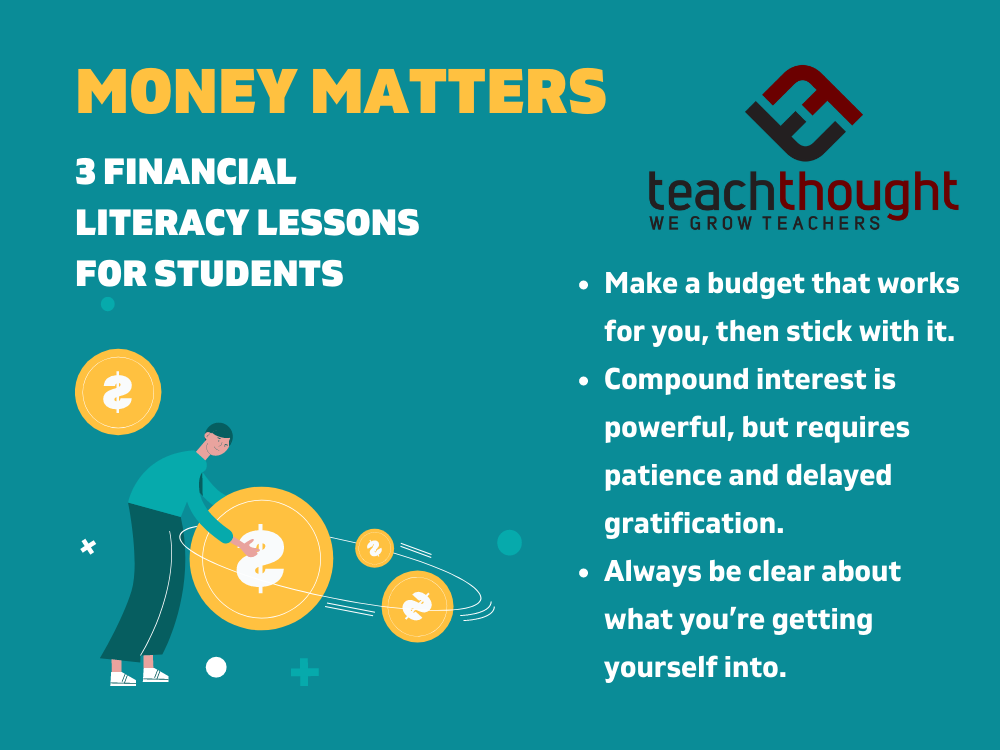
3 Financial Literacy Lessons For Students
contributed by Jess Holmes
As educators, we are responsible for more than just passing on knowledge and formulas; we are thought-makers and soul-crafters.
Also, we should be able to give students some practical know-how, and you don’t have to be teaching economics to provide sound advice. For example, math teachers could spice up their talks with concrete examples of the math skills students are learning, or history teachers could catch the audience’s interest with a comparison of money systems now and a few centuries ago.
Personal finance is a topic that will impact a young adult’s life significantly. Making the right choices from the beginning could mean the difference between having a great life-work balance or putting in extra hours while still struggling in debt.
See also 10 Ways Teachers Can Save Money On Printing
1. Make a budget that works for you, then stick to it.
Teachers are usually frugal spenders since their income does not permit extravagant items. This makes them more likely to be using a monthly budget. Talking about this with students does not only increase curiosity but could be a starting point for making them question their initial assumptions and open the discussion between the student and their families about money issues.
Teachers are expected to talk to students about their options for further education, like going to college, but usually, the talk remains in the academic area and money is not part of the discussion. This approach is wrong since only a 360 degrees evaluation of such a complex problem can offer the right answers. Otherwise, students find themselves in the unfortunate situation to take any job just to pay their student loan debt.
As a teacher, you can encourage them to learn more about this topic too before choosing a program that sounds interesting.
2. Compound interest is powerful, but requires patience and delayed gratification.
We are all told that we need to save money, but the math behind what choices we should make is usually not discussed. Compound interest is the tool that makes simple savings grow over time by giving the saver a return also on the interest earned, not only the initial investment.
Numerous online calculators show that if you start early enough (i.e., in your 20’s) and save consistently, you could retire as a millionaire without having a rich uncle leave you a fortune. It is all about making the right choices every day. This lesson is similar to leading a healthy lifestyle. The theory is straightforward, but sticking to the right thing and avoiding temptations is the hard part.
Math and computer science teachers could use these examples to motivate students and make them curious about ways to invest money. The stock market is not only for CEOs of Fortune 500 companies.
3. Always be clear about what you’re getting yourself into.
During a test, we always warn our students to read the problem or requirement carefully to be sure they give the full answer and get the best grade. However, we don’t stress enough this idea when it comes to real life.
Although all students can read a contract or a statement, do they really understand all the implications? Teach them to pay attention to the details such as fees, commissions, penalties and not only look at the final payments they have to make but to be meticulous and break that down into components.
When taking a loan or opening a new credit card, it is essential to know in advance how much you are going to spend with administrative costs. Tell them not to settle for the first option and use online portals, like the AAA Credit Guide to compare different credit companies before making a choice.
Modeling Your Experience
Of course, the best way to make sure these literacy lessons stick in the mind of your students is to practice what you preach and give them clear, real-life examples.
Even negative examples, including stories about the mistakes you have made and learned from, are excellent starting points to challenge them and make them more interested in improving their financial knowledge.